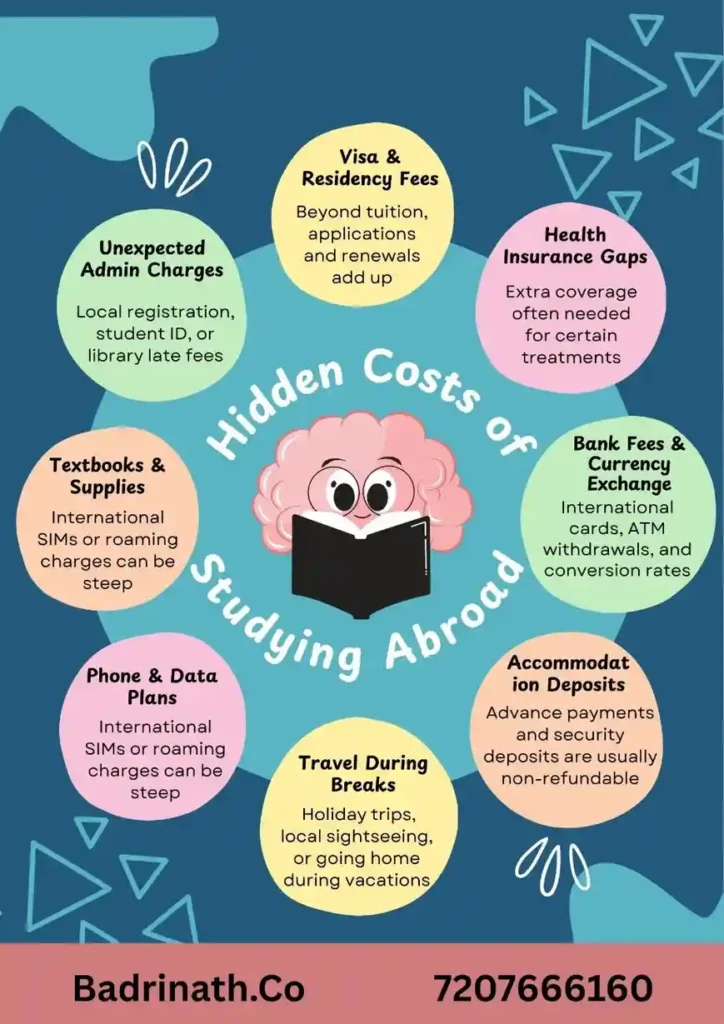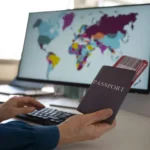Introduction
Studying abroad is a dream for many — new cultures, international degrees, and the thrill of independence. But here’s what people don’t talk about: the sneaky hidden expenses that show up uninvited. You’ve probably calculated tuition, housing, and airfare. But what about the rest?
Let’s rip the curtain off the unspoken costs you must be prepared for.

Hidden Expense #1: Visa and Residency Costs
Application Fees
These aren’t just paperwork costs — they can run into hundreds of dollars. Depending on your destination, you may also need biometric tests, document verifications, and travel just to attend visa interviews.
Residency Permit Renewal
In countries like Germany or France, you must renew your residence permit annually, and that costs time and money. The renewal process might also require additional documents and even translations.
Unexpected Delays and Legal Assistance
If something goes wrong with your visa or you’re asked to leave and reapply, you’re looking at serious expenses in travel, legal help, and lost income if you work part-time.
Hidden Expense #2: Health Insurance Gaps
Limited Coverage of Student Plans
Most universities offer basic insurance, but it may not cover dental, vision, or mental health services.
Out-of-Pocket Medical Costs
A broken tooth or a simple checkup might burn a hole in your wallet if your coverage is limited. Some medications or treatments aren’t even covered unless they’re emergencies.
Emergency or Specialist Care
Trips to ERs or visits to specialists often require co-pays or full upfront payment, especially in the US or UK.
Hidden Expense #3: Currency Conversion and Bank Fees
Exchange Rate Losses
Every time you convert currency, your bank takes a cut. Over time, these small cuts add up — think of it like death by a thousand fees.
ATM Withdrawal Charges
Using your home debit card abroad? Expect hefty ATM fees, sometimes up to $10 per transaction.
Bank Account Setups and Maintenance
Some banks charge international students monthly fees just to maintain an account. Others require a minimum balance — fail to meet it, and you’ll be penalized.
Hidden Expense #4: Travel Between Countries
Visiting Home for Emergencies
Life happens. A family emergency or a health issue might mean last-minute travel, which can cost triple during peak seasons.
Schengen or Regional Travel Visas
Studying in Europe? You’ll probably want to travel — but each country may require individual visas, adding hundreds in costs.
Peak Season Airfare
Festivals, semester breaks, and holidays mean higher fares. You’ll be competing with millions of other travelers for tickets.
Hidden Expense #5: Academic Supplies and Materials
Mandatory Books Not Covered in Tuition
Some courses require textbooks that cost $50-$200 each. In law or medical fields, these are unavoidable.
Lab or Studio Materials
Architecture? Science? Expect to buy your own models, lab coats, or kits. And yes, they’re expensive.
Printing and Software Subscriptions
Assignments still need printing. And that Adobe Creative Suite for your design class? It’s not free.
Hidden Expense #6: Housing Deposits and Rent Hikes
Multi-Month Deposits
Landlords often ask for 2-3 months’ rent upfront. That’s a big chunk of money gone before you even move in.
Furnishing Unfurnished Flats
Many international students are shocked to find apartments without furniture, curtains, or even light bulbs.
Hidden Maintenance Fees
Cleaning, heating, waste disposal — these might not be included in rent. Always read the fine print.
Hidden Expense #7: Cultural and Social Integration Costs
Socializing Expenses
Birthday dinners, outings, festivals — not participating can feel isolating, but joining in comes with a price tag.
Joining Clubs or Associations
Sports or cultural groups may charge membership fees. Attending events or competitions often requires travel or costumes/uniforms.
Local Transportation for Events
University life isn’t just the campus. Getting around town frequently? That means monthly bus/train passes, or ride-shares.
Hidden Expense #8: Unexpected Bureaucratic Charges
Document Translation and Notarization
Some countries want documents in their native language. Certified translation services can be shockingly expensive.
ID Cards and Registration Costs
Student ID, city registration, even library cards — you’d be surprised how many small fees pile up.
Postage and Courier for Official Documents
Submitting originals by courier or receiving letters from home often incurs courier fees — especially if deadlines are tight.

How to Prepare Before Leaving
List Down Every Potential Cost
Write down everything — even the little stuff like SIM cards, bedsheets, and groceries. Nothing is too small to count.
Speak to Past Students
Alumni or current students are the best source of truth. Ask them about what surprised them the most.
Read Fine Print of University Guidelines
Many universities list “estimated living costs.” Go beyond that and read about all mandatory and optional fees.
Psychological Impact of Financial Strain
Anxiety and Stress Management
Financial pressure adds invisible weight. Don’t ignore it. Seek help if you’re overwhelmed.
How to Seek Support
Most universities have mental health support. Some even offer financial counselling. Use them.
Balancing Work and Study
Don’t burn out trying to earn more. Health and academics matter just as much.
Part-Time Jobs and the Illusion of “Easy Money”
Work Limitations on Student Visas
Many countries restrict international students to 20 hours per week — sometimes only on-campus work is allowed.
Finding Legitimate Job Opportunities
Don’t fall for scams. Use official university job boards or verified platforms.
Balancing Time and Priorities
Your first job is to study. Don’t let work affect your grades — or your health.
Conclusion
Studying abroad is 100% worth it, but only if you go in with eyes wide open. The glamorous side of foreign education hides a bunch of expenses that can catch you off guard. But now that you know what to expect, you can prepare like a pro. Smart budgeting, thorough research, and a strong support system can make your study-abroad journey smooth and successful. Plan ahead, save more than you think you’ll need, and remember — you’re not alone in this!
External Links:
8 hidden expenses of studying abroad that no one warns you about
Top 10 Hidden Costs of Studying in Ireland and How to Save Money






